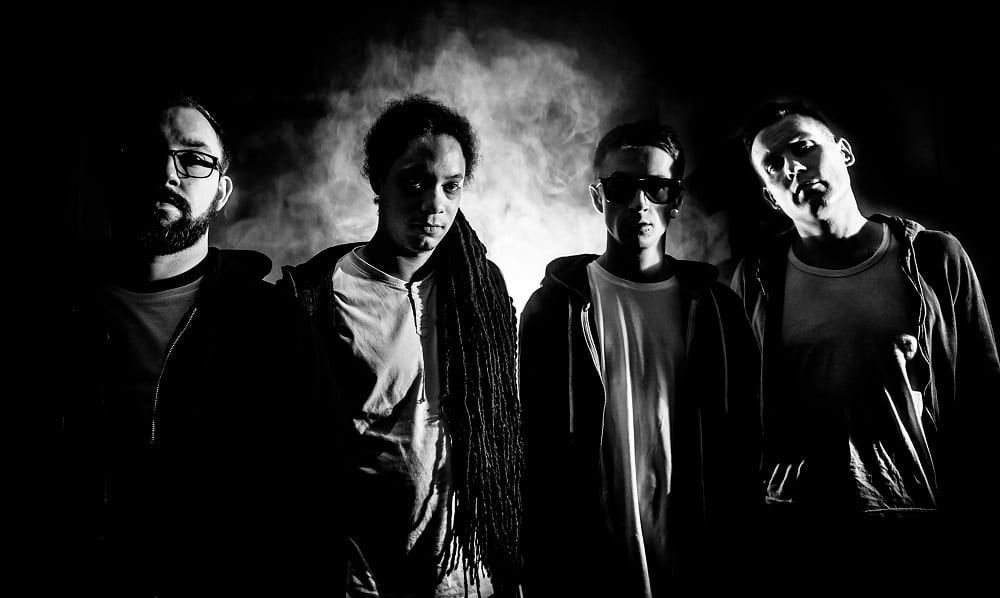Until their recent upload Breathe Out, you won’t have heard of London four-piece Blinding. Besides their immediate circle, no one had.
Yet the track marks the start of a highly ambitious project that will see the band deliver over an album’s worth of material throughout the year (a record every two weeks) and perform a key live debut in Shoreditch in June.
If everything goes to plan, by the end of the year their staple UKG/130 dark soul could potentially be a well-established element of many a DJ set and playlist.
With all four members having previous success and experience as solo artists, Blinding acts as a unique outlet for all members to explore their interests in cinematic, soundscape aesthetics while retaining full focus on the dancefloor. With a commendable recycling and resampling ethos, there’s some serious substance to their sonics, too. We had a chance to listen to some of the tracks they’re about to release and called them to find out more…
Introduce yourselves…
James: I’m player-manager, I’ve been following the guys for a while individually and when this project came around and knew I wanted to be part of it. Managing a lot of acts and doing the other work I do I don’t have much of an outlet for my own musical writing. I missed the vibe of playing my own music which is what I grew up doing.
Who’s next?
Ben: I’m Ben, I also work under the name NDread. I met Pete and Tom on June 6th, 2015.
Precision detailed facts!
Ben: We met at a BBC Introducing session. We were being interviewed on our solo stuff. We all got talking, exchanged numbers, met up and started writing music.
A whole album’s worth, right?
Ben: We were writing a whole load of things that were different to the style we’re at now. Then at the beginning of 2016 James came on board and we started to rework things in more of a garage/130 direction. We were a lot more abstract before but it’s become more danceable and upbeat. That’s James’s influence. He’s a good addition!
I can hear elements of the abstract on tracks like Burn You Down.
Ben: Yeah. That track follows the sound design ethos of a lot of the songs. We spend a lot of time making huge atmospheres and designing the sonics so when we start slotting the beat behind it you get something that like you say is “abstract”. We have a track called Dr P that starts that way until near the end of the tune when it finally drops.
Speaking of Dr P… What’s happening there? It’s not the dubstep DJ, I don’t think it’s the drink either…
Tom: Mad metaphors mate aha! It would take us hours and a whole bottle of whisky to work through it. I can explain the rest of the tune but that has to be deep, dark and shrouded in mystery.
Pete: I think coming from a production angle, when we first started writing I was in this strange headspace – we are really into field recordings and wanted to record sounds around London and take them into the lab and stretch them into these strange, twisted backdrops.
Tom: Yeah, you went away for a while then called me up and brought me in and we record four demos that day.
Pete: The first track from those demos was Wherever You Go – I’m doing the vocal, it’s a very dark story. “Steal your breath, cut your neck, don’t matter if you’re dead”. It was a dark place. I’d been reading Oscar Wilde and the picture of Dorian Gray. I was bouncing off that and the madness of being confined in big city but feeling isolated. So we all got in the studio and recreated that darkness. It was very reflective of the mood in very early dubstep.
Tom, do you produce too?
Tom: I throw chords in here and there but these guys are the computer geniuses but we write together. We’re all in the same room and all contributors.
Pete: It’s important that everyone has bought an equal amount of creativity.
Ben: The main thing is making sure we’re all on the same page. Writing with four different opinions can be challenging but there’s a beauty in it because it has to be really special for four people to like it. When you’re producing on your own you could be sitting there thinking it’s sick and then a few days later you’re like what the hell is this? So it’s a challenge but very rewarding.
Four stages of quality control…
Pete: James is the last line of quality control. He’s got a really good sense of when a track is done and how it should be. Everyone has a layer of input but James puts the icing on the cake.
He knows where to draw a line?
James: It’s similar to what Noisia have said – tunes aren’t ever finished, they’re just abandoned. Finding that moment when you have to let it go is something I have to do with other acts – It’s the same hat I wear with Blinding. Feeling that moment when it’s right to go ‘okay this is as finished as it can be’. The way we write as Blinding, our album could have taken another year with all types of directions explored. Dr P that we’ve discussed already for instance is one of Tom’s oldest songs and we’ve taken it in completely different directions.
Tom: I wrote it way before I got into electronic stuff. It’s special. It’s nice to have something of my past in this project. I used to busk it when I was 15. It’s great to hear it as a big production piece.
Ben: When he played the chords and sang it on the guitar I knew it was special song but you can never hear how it’s going to be until it’s finished. When we finally finished it, it sealed the whole album.
Pete: It’s reflection of our ethos. We stay away from plug-ins and soft synths where possible, we make our own sounds and manipulate them in samplers. It’s a very old school way – it’s how artists like Massive Attack or Portishead would have written. It’s the opposite to how a lot of acts write now. As a band we are creative recycling – the same way we recycle the sounds around us we’ve recycled Dr P. Me and Tom wrote a song called Heart Machine which is recycled on Breathe Out – recycling is a massive part of what we do.
Ben: There’s a few songs where we took a guitar and played chords with a violin bow and things like that.
Sonically it feels like it’s made for the live experience but in the studio it’s a lot more complex than I suspected…
James: We’re definitely looking to go live with this. But we’re doing it naturally. I’ve seen so many projects that create huge online hype but struggle to sell 2000 tickets for a London show then there are other bands who have done the circuit and played pub gigs and really worked up something special and can sell out a Brixton Academy. And the key to that is longevity. The first live show is June 28 – the Hoxton Kitchen in Shoreditch. We’ll launch the event with the first track, it gives us six months to sell tickets for the first full live show.
You played Glastonbury last year, didn’t you?
James: We did Glastonbury and Reading. The festival shows were DJ sets to road test the records then we spent the rest of last year working on them and finishing them up. We spent some time in a country house and sat in a studio putting the last finishing touches in things. The trip away helped us reflect on what had been done – that was the point we realised the amount of tunes we’d done were good records.
Pete: Things would have sounded different if we hadn’t done that. We picked the entire studio up and took it there. We pulled everything out of a bedroom and used that for three days.
And now we’re enjoying the fruits of this…
James: And you will every two weeks for the next six months, then once a month for the following six months. Stay tuned…
Tune in: Facebook / Soundcloud

